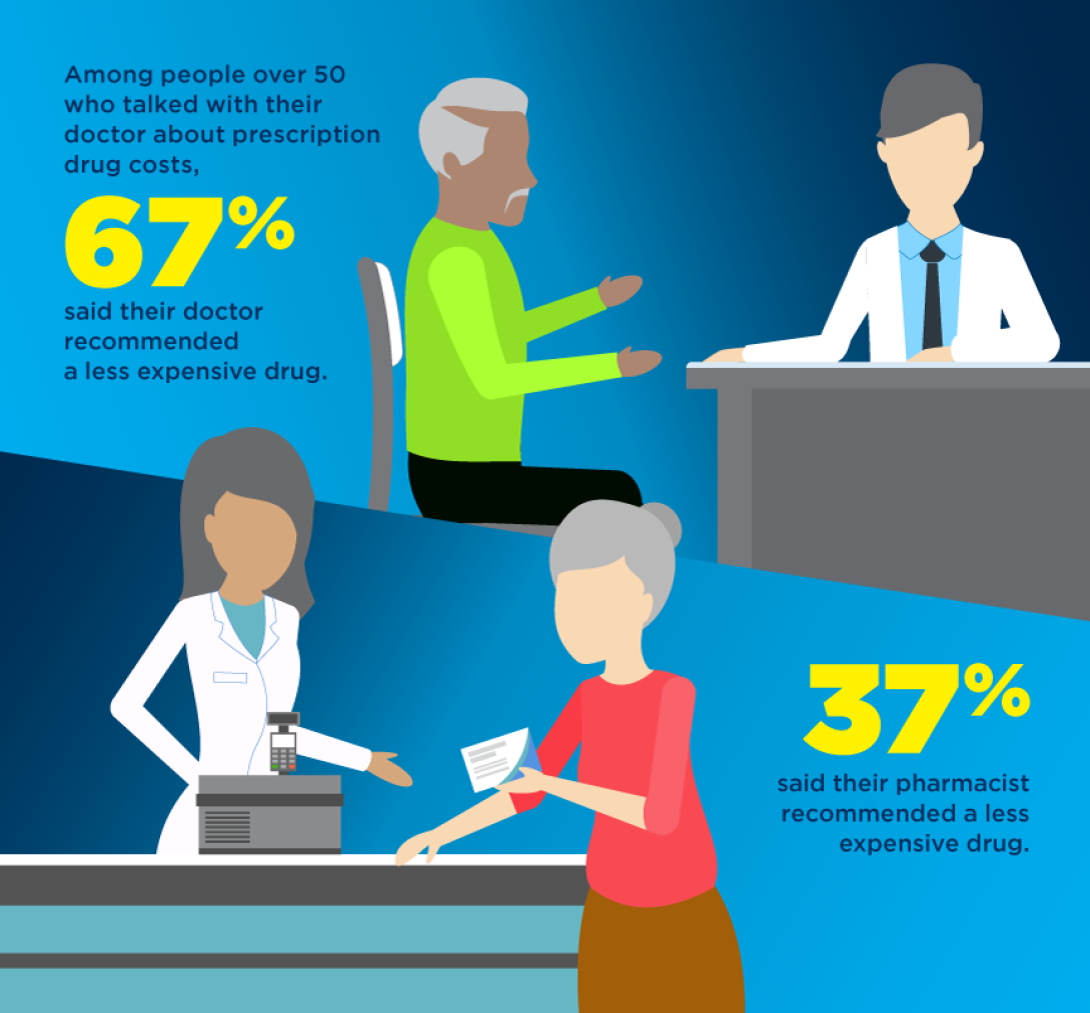Results from the new National Poll on Healthy Aging reveal opportunities for patients to speak up, and for professionals to aid more.
7:00 AM
Author |
The majority of Americans over age 50 take two or more prescription medicines, and many of them say the cost weighs on their budget, a new poll finds.
MORE FROM THE LAB: Subscribe to our weekly newsletter
But many older adults aren't getting — or asking for — as much help as they could from their doctors and pharmacists to find lower-cost options, the new data reveal.
This suggests an opportunity for health professionals and patients to talk more about drug costs, both in everyday interactions and in formal medication reviews that insurance may cover.
The data come from the University of Michigan National Poll on Healthy Aging, a new initiative based at the U-M Institute for Healthcare Policy and Innovation and sponsored by AARP and Michigan Medicine, U-M's academic medical center.
"We already know that cost can keep patients from taking the drugs they need to maintain health or prevent complications, but these new data suggest that many older adults aren't talking to their doctors or pharmacists about cost and less-expensive alternatives as often as they could," says Preeti Malani, M.D., director of the poll and a professor of internal medicine at the U-M Medical School. "This represents an opportunity for patients and clinicians as well as health systems, insurers and policymakers."
Alison Bryant, AARP senior vice president of research, adds that out-of-pocket costs can vary greatly for midlife and older adults, depending on their insurance coverage for prescription drugs and the price set by the manufacturer. High and rising drug costs can result in higher out-of-pocket costs and more cost burden.
We see a need for health professionals to find ways to more routinely engage with patients about cost, especially through formal medication reviews such as the one that Medicare will cover.Preeti Malani, M.D.
Cost burdens and communication — or lack of it
The poll asked a range of prescription drug-related questions of adults between the ages of 50 and 80 to try to understand how prescription-related issues affect those in the pre-Medicare and Medicare age range.
SEE ALSO: Why Does Dying Cost More for People of Color
In all, 27 percent of them said their prescription drug costs posed a financial burden.
One in six respondents reported what the researchers call a "high complexity" of prescription management, taking six or more prescriptions and seeing more than one doctor. They were more likely to say their drug costs were a problem.
Among those who said their drug costs posed a burden, 49 percent hadn't talked to their doctors about the cost of their drugs. But taking time to talk did pay off for many: 67 percent of those who reported talking to their doctor about cost received a recommendation for a less expensive drug, and 37 percent got similar recommendations from pharmacists.
"Based on these findings and other evidence, we encourage patients to speak up during their clinic visits, and when they're at the pharmacy, and ask about ways to reduce the cost of their prescriptions," says Malani. "But equally, we see a need for health professionals to find ways to more routinely engage with patients about cost, especially through formal medication reviews such as the one that Medicare will cover."

More about drug costs and health
Doctors, clinic staff and pharmacists can help patients identify options from drug companies that might reduce costs by reducing copayments or overall price, and recommend generic equivalents when available, Malani says.
She notes that during patient visits, physicians usually don't have access to how much drugs will cost individual patients, based on what insurance they have. So, it can be up to the patient to bring this information to their appointments, or to contact their clinic about alternatives if the cost at the pharmacy is higher than they expected. Patients can also talk with pharmacists, who may better understand insurance plans and cost.
SEE ALSO: Even with Insurance, Hospital Patients May Pay Over $1,000 for Stay
Patients with high and moderate complexity of drug management take multiple medications and have more than one doctor involved in their care. This can create additional challenges, including one doctor not wanting to address a medication prescribed by another doctor.
Health conditions that start in middle age can make a major difference in the health of older adults and the long-term cost of care. Multiple studies have found that long-term medication adherence affects a person's health outcomes in positive ways.
But other research shows that cost often gets in the way of adherence, leading a person to cut back on doses without a doctor's guidance, to not refill a prescription or to skip doses altogether.
Although addressing the broader concern of drug costs will require shifts in policy, patients can take immediate steps by asking their doctors and pharmacists for help, Malani says. Future programs should encourage health professionals and patients to routinely have these discussions.
The need to talk cost may start earlier than one might think, Malani notes. The poll found that more than half of adults in the 50-to-64 age range took two or more medications — and 14 percent took six or more.
In the age group of 65 to 80 years, 20 percent said they took six or more medications. Nearly 90 percent of those in the older group were taking at least one prescription drug, consistent with previous studies. One in four of the older adults reported seeing four or more doctors in the past year.
The nationally representative sample consisted of 2,131 people, split almost equally between those ages 50 to 64 and those 65 to 80. Respondents answered a wide range of questions online; laptops and internet access were provided to those who did not have it.
A full report of the findings and methodology is available at HealthyAgingPoll.org.
The poll will issue its next findings in late summer; sign up for email notifications on the website.
Additional resources on prescription costs:
-
AARP issued a special report on drug costs, and offers tips for talking about cost and other issues with doctors and pharmacists. An AARP poll last year found that 81 percent of people over age 50 thought drug prices were too high. Of those who had not filled a prescription they'd been given in the previous two years, more than half did so because of cost.
-
A recent Kaiser Family Foundation poll found that more than half of Americans wanted the lowering of prescription drug costs to be a top priority for the federal government.
-
The National Institute on Aging offers a toolkit for clinicians on communicating with older patients about issues, including medication management and cost.
-
The Partnership for Prescription Assistance, created by pharmaceutical companies, has a website that people can use to see if they might be eligible for an assistance program that could reduce the cost of a prescribed drug.

Explore a variety of health care news & stories by visiting the Health Lab home page for more articles.

Department of Communication at Michigan Medicine
Want top health & research news weekly? Sign up for Health Lab’s newsletters today!





